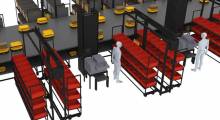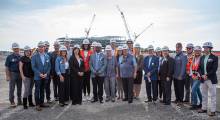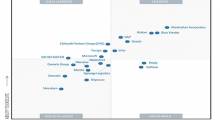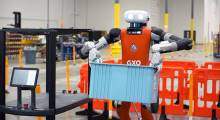Instacart, a leading online grocery provider, last week unveiled the first phase of an initiative to bring automated fulfillment technology to retailers across the U.S. and Canada. As part of the initiative, the San Francisco-based company announced it has signed a multi-year strategic deal with micro-fulfillment company Fabric. It will integrate robots and software with Instacart's proprietary technology to create new e-commerce services for retail partners and a faster, easier online grocery shopping experience for customers, said the partners.
“Instacart is proud to serve as the chief ally to retailers during a time when e-commerce in North America is poised for accelerated adoption,” stated Mark Schaaf, chief technology officer of Instacart. “Our next-gen fulfillment initiative combines our robust technology suite and dedicated community of shoppers with robotics solutions to give retailers even more ways to serve their customers online.”
“Our next-gen fulfillment work will also help reduce some of the things that make in-store shopping cumbersome for Instacart shoppers, like crowded store aisles, out-of-stock items, and long checkout lines,” he added. “Over the long term, we believe partnering with retailers to bring next-gen fulfillment technologies together with the personal touch and care of Instacart’s shopper community will create an even more seamless online grocery experience that’s faster and more affordable for customers and delivers even more value and growth to retailers.”
Robots plus people for faster fulfillment
Instacart said its technology and Fabric's software and automation will power a new fulfillment process within dedicated warehouses and existing retailer locations. The process will combine the speed of robotics with the human touch and attention to detail of Instacart shoppers, claimed the company. This will enable it to more quickly fulfill customers' grocery orders, ranging from packaged goods, household essentials, and produce to deli items, frozen food, and alcohol.
Once orders are carefully packed, shoppers will deliver orders to customers’ doors or place them in staging areas for curbside pickup. Instacart said it plans to kick off early-stage concept pilots in partnership with Fabric and grocery retail partners over the coming year and beyond.
“Everything about our micro-fulfillment solution has been built for speed, efficiency, and elasticity to meet today’s on-demand requirements,” said Elram Goren, co-founder and CEO of Fabric. “Our software-led robotics and modular solution gives grocery retailers the flexibility to build the fulfillment solution that best fits the needs of their business. With Instacart as a partner, we see an enormous opportunity to integrate our product and services into Instacart’s e-commerce solutions to provide a compelling service offering for grocers.”
Instacart said the next-generation fulfillment initiative adds robotics to its existing offerings, including the Instacart marketplace, which features more than 600 national, regional, and local retailers and unique brand names. Its also offers Instacart Enterprise, a white-label, enterprise-grade technology solution, as well as Instacart Ads, which connects thousands of consumer packaged goods (CPG) brands directly to customers online.
About Instacart and Fabric
Instacart provides same-day delivery and pickup services from nearly 55,000 stores across more than 5,500 cities in North America. The company said its delivery service is available to over 85% of U.S. households and 80% of Canadian households. Its enterprise technology also powers the e-commerce platforms of some of the world’s biggest retail players, supporting their websites, applications, and deliveries. Instacart offers an Instacart Express membership that includes reduced service fees and unlimited free delivery on orders over $35.
Founded in 2015, Fabric is a retail technology company on a mission to enable on-demand retail, for everyone. The company is backed by investors including Corner Ventures, Innovation Endeavors, Aleph, Playground Ventures, Canada Pension Plan Investment Board (CPPIB), Evolv (Kraft Heinz), and Temasek, and it raised $110 million in Series B funding in October 2019.
The company, also known as Get Fabric Inc. and CommonSense Robotics Ltd., has offices in New York, Atlanta, and Tel Aviv, Israel, with over 200 team members globally. It has developed its own proprietary software, and it runs micro-fulfillment operations for grocery and general merchandise retailers in New York, Tel Aviv, and Washington, D.C. Fabric is planning to expand across five major U.S. metropolitan areas in the coming months.
Article topics
Email Sign Up
















